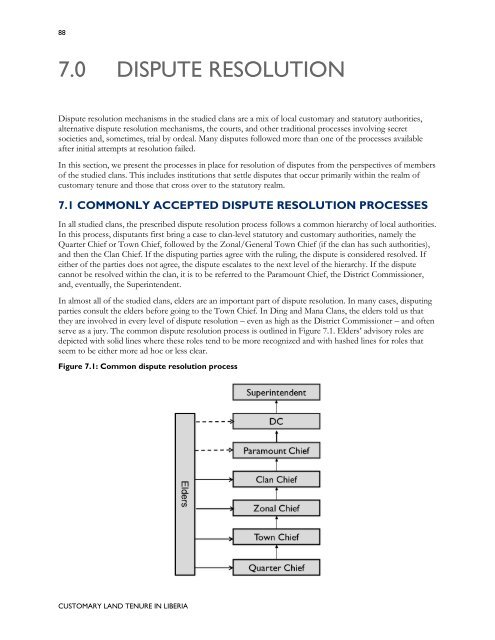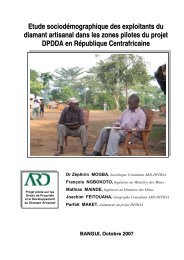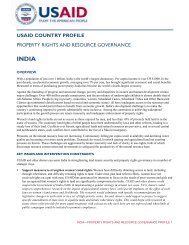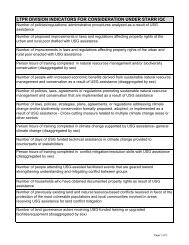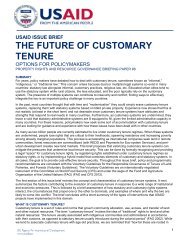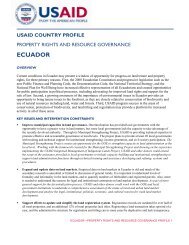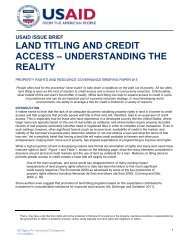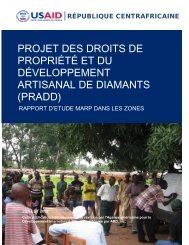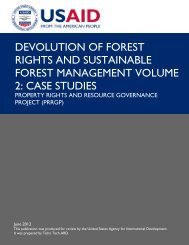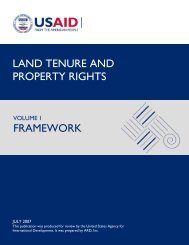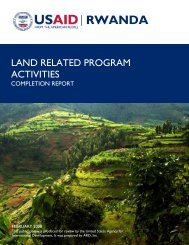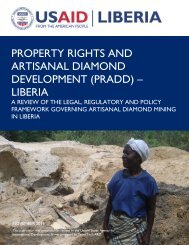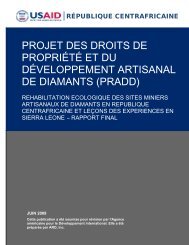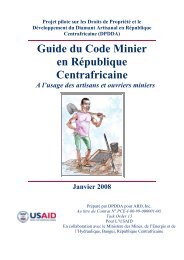Customary Land Tenure in Liberia - Land Tenure and Property ...
Customary Land Tenure in Liberia - Land Tenure and Property ...
Customary Land Tenure in Liberia - Land Tenure and Property ...
You also want an ePaper? Increase the reach of your titles
YUMPU automatically turns print PDFs into web optimized ePapers that Google loves.
88<br />
7.0 DISPUTE RESOLUTION<br />
Dispute resolution mechanisms <strong>in</strong> the studied clans are a mix of local customary <strong>and</strong> statutory authorities,<br />
alternative dispute resolution mechanisms, the courts, <strong>and</strong> other traditional processes <strong>in</strong>volv<strong>in</strong>g secret<br />
societies <strong>and</strong>, sometimes, trial by ordeal. Many disputes followed more than one of the processes available<br />
after <strong>in</strong>itial attempts at resolution failed.<br />
In this section, we present the processes <strong>in</strong> place for resolution of disputes from the perspectives of members<br />
of the studied clans. This <strong>in</strong>cludes <strong>in</strong>stitutions that settle disputes that occur primarily with<strong>in</strong> the realm of<br />
customary tenure <strong>and</strong> those that cross over to the statutory realm.<br />
7.1 COMMONLY ACCEPTED DISPUTE RESOLUTION PROCESSES<br />
In all studied clans, the prescribed dispute resolution process follows a common hierarchy of local authorities.<br />
In this process, disputants first br<strong>in</strong>g a case to clan-level statutory <strong>and</strong> customary authorities, namely the<br />
Quarter Chief or Town Chief, followed by the Zonal/General Town Chief (if the clan has such authorities),<br />
<strong>and</strong> then the Clan Chief. If the disput<strong>in</strong>g parties agree with the rul<strong>in</strong>g, the dispute is considered resolved. If<br />
either of the parties does not agree, the dispute escalates to the next level of the hierarchy. If the dispute<br />
cannot be resolved with<strong>in</strong> the clan, it is to be referred to the Paramount Chief, the District Commissioner,<br />
<strong>and</strong>, eventually, the Super<strong>in</strong>tendent.<br />
In almost all of the studied clans, elders are an important part of dispute resolution. In many cases, disput<strong>in</strong>g<br />
parties consult the elders before go<strong>in</strong>g to the Town Chief. In D<strong>in</strong>g <strong>and</strong> Mana Clans, the elders told us that<br />
they are <strong>in</strong>volved <strong>in</strong> every level of dispute resolution – even as high as the District Commissioner – <strong>and</strong> often<br />
serve as a jury. The common dispute resolution process is outl<strong>in</strong>ed <strong>in</strong> Figure 7.1. Elders‟ advisory roles are<br />
depicted with solid l<strong>in</strong>es where these roles tend to be more recognized <strong>and</strong> with hashed l<strong>in</strong>es for roles that<br />
seem to be either more ad hoc or less clear.<br />
Figure 7.1: Common dispute resolution process<br />
CUSTOMARY LAND TENURE IN LIBERIA


